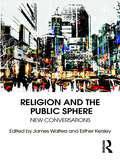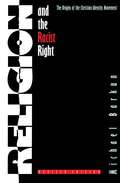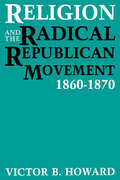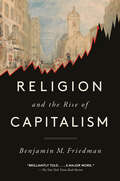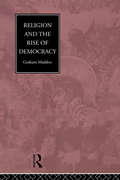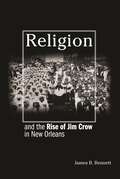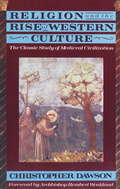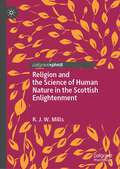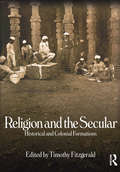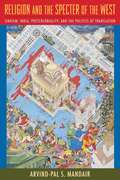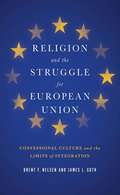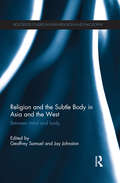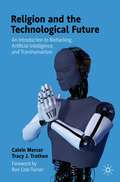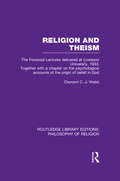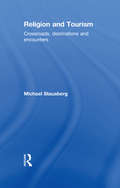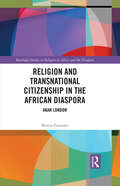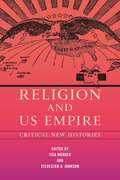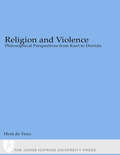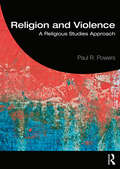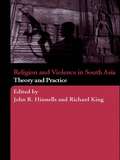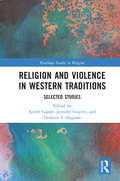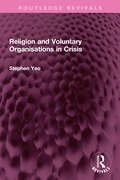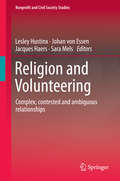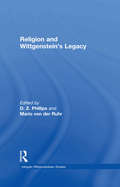- Table View
- List View
Religion and the Public Sphere: New Conversations
by James Walters Esther KersleyReligion and the Public Sphere: New Conversations explores the changing contribution of religion to public life today. Bringing together a diverse group of preeminent scholars on religion, each chapter explores an aspect of religion in the public realm, from law, liberalism, the environment and security to the public participation of religious minorities and immigration. This book engages with religion in new ways, going beyond religious literacy or debates around radicalisation, to look at how religion can contribute to public discourse. Religion, this book will show, can help inform the most important debates of our time.
Religion and the Racist Right
by Michael BarkunAccording to Michael Barkun, many white supremacist groups of the radical right are deeply committed to the distinctive but little-recognized religious position known as Christian Identity. In Religion and the Racist Right (1994), Barkun provided the first sustained exploration of the ideological and organizational development of the Christian Identity movement. In a new chapter written for the revised edition, he traces the role of Christian Identity figures in the dramatic events of the first half of the 1990s, from the Oklahoma City bombing and the rise of the militia movement to the Freemen standoff in Montana. He also explores the government's evolving response to these challenges to the legitimacy of the state. Michael Barkun is professor of political science in the Maxwell School of Citizenship and Public Affairs at Syracuse University. He is author of several books, including Crucible of the Millennium: The Burned-over District of New York in the 1840s.
Religion and the Radical Republican Movement: 1860–1870
by Victor B. Howard&“A distinctive contribution on the influence of Christians on Union politics during the Civil War era.&” —Ohio HistoryReligion and the Radical Republican Movement, 1860–1870 is a study of the interplay of religion and politics during the Civil War era. More specifically, it examines the extent to which religion set the moral tone of the North during the period of 1860 through 1870. Howard focuses on the growing influence of the evangelical and liberal churches during the period. This influence was largely exerted through the agency of the radical Republicans, a faction that took an extreme position on war measures and on reconstruction after the war. This book examines the degree to which radicalism was inspired by moral motivation and the action that followed the moral commitment. &“The author&’s prodigious research and stacks of quotations convincingly display the northern church&’s commitment to black suffrage and to the era&’s important congressional legislation bearing on black rights and other central Reconstruction issues.&” —Choice
Religion and the Rise of Capitalism
by Benjamin M. FriedmanFrom one of the nation's preeminent experts on economic policy, a major reassessment of the foundations of modern economic thinking that explores the profound influence of an until-now unrecognized force--religion.Critics of contemporary economics complain that belief in free markets--among economists as well as many ordinary citizens--is a form of religion. And, it turns out, that in a deeper, more historically grounded sense there is something to that idea. Contrary to the conventional historical view of economics as an entirely secular product of the Enlightenment, Benjamin M. Friedman demonstrates that religion exerted a powerful influence from the outset. Friedman makes clear how the foundational transition in thinking about what we now call economics, beginning in the eighteenth century, was decisively shaped by the hotly contended lines of religious thought within the English-speaking Protestant world. Beliefs about God-given human character, about the after-life, and about the purpose of our existence, were all under scrutiny in the world in which Adam Smith and his contemporaries lived. Friedman explores how those debates go far in explaining the puzzling behavior of so many of our fellow citizens whose views about economic policies--and whose voting behavior--seems sharply at odds with what would be to their own economic benefit. Illuminating the origins of the relationship between religious thinking and economic thinking, together with its ongoing consequences, Friedman provides invaluable insights into our current economic policy debates and demonstrates ways to shape more functional policies for all citizens.
Religion and the Rise of Democracy
by Graham MaddoxIn a major original study, Graham Maddox analyses the role of religion in the development of democracy from the tribes of ancient Israel to the present day. The book contrasts Athenian direct democracy with the Old Testament monarchy in which the concept of religious opposition - vital to modern democracy - arose. Maddox then develops his discussion of the relationship between religion and democracy through early christianity to the Reformation and Calvinism, ending with a chapter on modern democracy. Maddox's contentious thesis concerning the development of democracy is truly interdisciplinary drawing on political science, religious history and theology.
Religion and the Rise of Jim Crow in New Orleans
by James B. BennettReligion and the Rise of Jim Crow in New Orleans examines a difficult chapter in American religious history: the story of race prejudice in American Christianity. Focusing on the largest city in the late-nineteenth-century South, it explores the relationship between churches--black and white, Protestant and Catholic--and the emergence of the Jim Crow laws, statutes that created a racial caste system in the American South. The book fills a gap in the scholarship on religion and race in the crucial decades between the end of Reconstruction and the eve of the Civil Rights movement. Drawing on a range of local and personal accounts from the post-Reconstruction period, newspapers, and church records, Bennett's analysis challenges the assumption that churches fell into fixed patterns of segregation without a fight. In sacred no less than secular spheres, establishing Jim Crow constituted a long, slow, and complicated journey that extended well into the twentieth century. Churches remained a source of hope and a means of resistance against segregation, rather than a retreat from racial oppression. Especially in the decade after Reconstruction, churches offered the possibility of creating a common identity that privileged religious over racial status, a pattern that black church members hoped would transfer to a national American identity transcending racial differences. Religion thus becomes a lens to reconsider patterns for racial interaction throughout Southern society. By tracing the contours of that hopeful yet ultimately tragic journey, this book reveals the complex and mutually influential relationship between church and society in the American South, placing churches at the center of the nation's racial struggles.
Religion and the Rise of Western Culture
by Christopher DawsonThis classic study of European history sweeps from the fall of Rome to the dawn of the Renaissance as it shows how Christianity, its leaders, and its institutions changed the face of Western culture.
Religion and the Science of Human Nature in the Scottish Enlightenment
by R.J.W. MillsThis book examines how enlightened Scottish social theorists c.1740 to c.1800 understood the origin and development of religion. Challenging scholarly disregard for the topic, it shows how most prominent thinkers of the Scottish Enlightenment thought deeply about the relationship between religion, human nature and historical change. The Scots viewed this relationship as an important strand within the study of the 'science of human nature' and the 'history of man.' The fruits of this investigation were a sophisticated and innovative account of religious change that is characterized by a striking modernity and naturalism, even by the more devout theorists. The views of the literati surveyed here need to be incorporated into our larger histories of the 'science of religion' as much as they do into our understanding of the social theory of the Scottish Enlightenment.
Religion and the Secular: Historical and Colonial Formations
by Timothy FitzgeraldReligion has dominated colonialism since the 16th century. 'Religion and the Secular' critically examines how religion has been used to subject indigenous concepts to the needs of colonial powers. Essays present the colonial relationship from the perspective of colonized cultures - including Mexico, Guatemala, Vietnam, India, Japan, South Africa and Canada - and colonizing powers, namely England, Germany and the United States. The volume offers a historical and ethnographical analysis of the relationship between the sacred and the secular, examining religion in relation to politics, economics and civil power.
Religion and the Specter of the West: Sikhism, India, Postcoloniality, and the Politics of Translation (Insurrections: Critical Studies in Religion, Politics, and Culture)
by Arvind-Pal MandairArguing that intellectual movements, such as deconstruction, postsecular theory, and political theology, have different implications for cultures and societies that live with the debilitating effects of past imperialisms, Arvind Mandair unsettles the politics of knowledge construction in which the category of "religion" continues to be central. Through a case study of Sikhism, he launches an extended critique of religion as a cultural universal. At the same time, he presents a portrait of how certain aspects of Sikh tradition were reinvented as "religion" during the late nineteenth and early twentieth centuries. India's imperial elite subtly recast Sikh tradition as a sui generis religion, which robbed its teachings of their political force. In turn, Sikhs began to define themselves as a "nation" and a "world religion" that was separate from, but parallel to, the rise of the Indian state and global Hinduism. Rather than investigate these processes in isolation from Europe, Mandair shifts the focus closer to the political history of ideas, thereby recovering part of Europe's repressed colonial memory. Mandair rethinks the intersection of religion and the secular in discourses such as history of religions, postcolonial theory, and recent continental philosophy. Though seemingly unconnected, these discourses are shown to be linked to a philosophy of "generalized translation" that emerged as a key conceptual matrix in the colonial encounter between India and the West. In this riveting study, Mandair demonstrates how this philosophy of translation continues to influence the repetitions of religion and identity politics in the lives of South Asians, and the way the academy, state, and media have analyzed such phenomena.
Religion and the State in American Law
by Boris I. BittkerReligion and the State in American Law provides a comprehensive and up-to-date overview of religion and government in the United States, from historical origins to modern laws and rulings. In addition to extensive coverage of the religion clauses of the First Amendment, it addresses many statutory, regulatory, and common-law developments at both the federal and state levels. Topics include the history of church-state relations and religious liberty, religion in the classroom, and expressions of religion in government. This book also covers the role of religion in specific areas of law such as contracts, taxation, employment, land use regulation, torts, criminal law, and domestic relations as well as in specialized contexts such as prisons and the military. Accessible to the general as well as the professional reader, this book will be of use to scholars, judges, practising lawyers, and the media.
Religion and the Struggle for European Union: Confessional Culture and the Limits of Integration (Religion and Politics)
by Brent F. Nelsen James L. Guth<p>In <i>Religion and the Struggle for European Union</i>, Brent F. Nelsen and James L. Guth delve into the powerful role of religion in shaping European attitudes on politics, political integration, and the national and continental identities of its leaders and citizens. <p>Nelsen and Guth contend that for centuries Catholicism promoted the universality of the Church and the essential unity of Christendom. Protestantism, by contrast, esteemed particularity and feared Catholic dominance. These differing visions of Europe have influenced the process of postwar integration in profound ways. Nelsen and Guth compare the Catholic view of Europe as a single cultural entity best governed as a unified polity against traditional Protestant estrangement from continental culture and its preference for pragmatic cooperation over the sacrifice of sovereignty. As the authors show, this deep cultural divide, rooted in the struggles of the Reformation, resists the ongoing secularization of the continent. Unless addressed, it threatens decades of hard-won gains in security and prosperity. <p>Farsighted and rich with data, <i>Religion and the Struggle for European Union</i> offers a pragmatic way forward in the EU's attempts to solve its social, economic, and political crises.
Religion and the Subtle Body in Asia and the West: Between Mind and Body
by Geoffrey Samuel Jay JohnstonSubtle-body practices are found particularly in Indian, Indo-Tibetan and East Asian societies, but have become increasingly familiar in Western societies, especially through the various healing and yogic techniques and exercises associated with them. This book explores subtle-body practices from a variety of perspectives, and includes both studies of these practices in Asian and Western contexts. The book discusses how subtle-body practices assume a quasi-material level of human existence that is intermediate between conventional concepts of body and mind. Often, this level is conceived of in terms of an invisible structure of channels, associated with the human body, through which flows of quasi-material substance take place. Contributors look at how subtle-body concepts form the basic explanatory structure for a wide range of practices. These include forms of healing, modes of exercise and martial arts as well as religious practices aimed at the refinement and transformation of the human mindbody complex. By highlighting how subtle-body practices of many kinds have been introduced into Western societies in recent years, the book explores the possibilities for new models of understanding which these concepts open up. It is a useful contribution to studies on Asian Religion and Philosophy.
Religion and the Technological Future: An Introduction to Biohacking, Artificial Intelligence, and Transhumanism
by Calvin Mercer Tracy J. TrothenWe live in an age of rapid technological advancement. Never before has humankind wielded so much power over our own biology. Biohacking, the attempt at human enhancement of physical, cognitive, affective, moral, and spiritual traits, has become a global phenomenon. This textbook introduces religious and ethical implications of biohacking, artificial intelligence, and other technological changes, offering perspectives from monotheistic and karmic religions and applied ethics. These technological breakthroughs are transforming our societies and ourselves fundamentally via genetic modification, tissue engineering, artificial intelligence, robotics, the merging of computer technology with human biology, extended reality, brain stimulation, and nanotechnology. The book also considers the extreme possibilities of mind uploading, cryonics, and superintelligence. Chapters explore some of the political, economic, sociological, and psychological dimensions of these advances, with bibliographies for further study and questions for discussion. The technological future is here – and it is up to us to decide its moral and religious shape.
Religion and Theism: The Forwood Lectures Delivered at Liverpool University, 1933. Together with a Chapter on the Psychological Accounts of the Origin of Belief in God (Routledge Library Editions: Philosophy of Religion)
by Clement C.J. WebbFour lectures on the Philosophy of Religion are included in this compact book along with an extra chapter on the psychology of belief in God. In a search for an acceptable theism, the author examines religious faith and human personality via many theories and facets of thinking, referring to psychologists, theologians and philosophers who have battled with similar questions. Originally published a year after the lectures were presented, this is an interesting classic volume by a well-known theorist of the early Twentieth Century.
Religion and Tourism: Crossroads, Destinations and Encounters
by Michael StausbergThis book explores the dynamic interaction between religion and tourism in the modern world. It considers questions such as: do travellers leave their religion at home when they are touring – and what happens if not? what are the relationships between tourism and pilgrimage? what happens to religious performances, places and festivals that function as tourism attractions? Other chapters examine religious theme parks, wellness and spa tourism, the roles played by tourist guides, guidebooks and religious souvenirs, and the role of tourism as a major arena of religious encounters in the contemporary world. Surveying the growing body of work in the field, Michael Stausberg argues that tourism should be a major focus of research within religious studies.
Religion and Transnational Citizenship in the African Diaspora: Akan London (Routledge Studies on Religion in Africa and the Diaspora)
by Mattia FumantiThis book focuses on Akan-speaking Ghanaians in London and explores in detail the experience of African migrants living in Britain, investigating how they construct their British citizenship through their membership of the church. Building on extensive ethnographic research in London and Ghana, the author explores the relationship between religion and citizenship, the emergence of transnational subjectivities, and the making of diaspora aesthetics among African migrants. Starting from the understanding that citizenship is dialogical, a status mediated by a subject’s multiple and intersecting identities, the author highlights the limitations of existing conceptualisations of migrant citizenship. Anchored in a case study of the British/Ghanaian Methodist Church as a transnational religious organisation and cultural polity, the book explores diasporic religious subjectivities as both cosmopolitan and transnational, while being configured in emotionally and morally significant ways by the Methodist Church, as well as family, ethnicity, and nation. Interdisciplinary by nature, this book will be of interest to a wide range of researchers and scholars across the social sciences and humanities working in the fields of anthropology, religion, sociology, postcolonial studies, and African studies, and additionally policy makers interested in diaspora and migration studies.
Religion and US Empire: Critical New Histories (North American Religions)
by Tisa Wenger and Sylvester A. JohnsonShows how American forms of religion and empire developed in tandem, shaping and reshaping each other over the course of American historyThe United States has been an empire since the time of its founding, and this empire is inextricably intertwined with American religion. Religion and US Empire examines the relationship between these dynamic forces throughout the country’s history and into the present. The volume will serve as the most comprehensive and definitive text on the relationship between US empire and American religion.Whereas other works describe religion as a force that aided or motivated American imperialism, this comprehensive new history reveals how imperialism shaped American religion—and how religion historically structured, enabled, challenged, and resisted US imperialism. Chapters move chronologically from the eighteenth century to the twenty-first, ranging geographically from the Caribbean, Michigan, and Liberia, to Oklahoma, Hawai’i, and the Philippines. Rather than situating these histories safely in the past, the final chapters ask readers to consider present day entanglements between capitalism, imperialism, and American religion. Religion and US Empire is an urgent work of history, offering the context behind a relationship that is, for better or worse, very much alive today.
Religion and Violence: Philosophical Perspectives from Kant to Derrida
by Hent de VriesChosen as an Outstanding Academic Title for 2003 by Choice MagazineOriginally published in 2002. Does violence inevitably shadow our ethico-political engagements and decisions, including our understandings of identity, whether collective or individual? Questions that touch upon ethics and politics can greatly benefit from being rephrased in terms borrowed from the arsenal of religious and theological figures, because the association of such figures with a certain violence keeps moralism, whether in the form of fideism or humanism, at bay. Religion and Violence: Philosophical Perspectives from Kant to Derrida's careful posing of such questions and rearticulations pioneers new modalities for systematic engagement with religion and philosophy alike.
Religion and Violence: A Religious Studies Approach
by Paul R. PowersDoes religion cause much of the world’s violence? Is religion inherently violent? Would violence disappear if religion did? Is true religion a force for peace? Is religion a mask for power and self-interest? What aspects of religion make violence more—or less—likely? Religion and Violence: A Religious Studies Approach explores the potential of classic social theories to shed light on the relationships between religion and violence. This accessible and engaging book starts from the premise that both religion and violence are ordinary elements of social life and that rather than causing violence religion plays a crucial role in the management of violence. Ideal for any student approaching the topic of religion and violence for the first time, this core textbook includes chapter overviews and summaries, guides for applying theory to real-world events, discussion questions, and case studies. Further teaching and learning resources are available on the accompanying companion website.
Religion and Violence in South Asia: Theory and Practice
by John R. Hinnells Richard KingDo religions justify and cause violence or are they more appropriately seen as forces for peace and tolerance? Featuring contributions from international experts in the field, this book explores the debate that has emerged in the context of secular modernity about whether religion is a primary cause of social division, conflict and war, or whether this is simply a distortion of the ‘true’ significance of religion and that if properly followed it promotes peace, harmony, goodwill and social cohesion. Focusing on how this debate is played out in the South Asian context, the book engages with issues relating to religion and violence in both its classical and contemporary formations. The collection is designed to look beyond the stereotypical images and idealized portrayals of the peaceful South Asian religious traditions (especially Hindu, Buddhist, Jain and Sufi), which can occlude their own violent histories and to analyze the diverse attitudes towards, and manifestations of violence within the major religious traditions of South Asia. Divided into three sections, the book also discusses globalization and the theoretical issues that inform contemporary discussions of the relationship between religion and violence.
Religion and Violence in Western Traditions: Selected Studies (Routledge Studies in Religion)
by André GagnéThis book examines the connection between religion and violence in the Western traditions of the three Abrahamic faiths, from ancient to modern times. It addresses a gap in the scholarly debate on the nature of religious violence by bringing scholars that specialize in pre-modern religions and scriptural traditions into the same sphere of discussion as those specializing in contemporary manifestations of religious violence. Moving beyond the question of the “authenticity” of religious violence, this book brings together scholars from a variety of disciplines. Contributors explore the central role that religious texts have played in encouraging, as well as confronting, violence. The interdisciplinary conversation that takes place challenges assumptions that religious violence is a modern problem that can be fully understood without reference to religious scriptures, beliefs, or history. Each chapter focuses its analysis on a particular case study from a distinct historical period. Taken as a whole, these chapters attest to the persistent relationship between religion and violence that links the ancient and contemporary worlds. This is a dynamic collection of explorations into how religion and violence intersect. As such, it will be a key resource for any scholar of Religious Studies, Theology and Religion and Violence, as well as Christian, Jewish, and Islamic Studies.
Religion and Voluntary Organisations in Crisis (Routledge Revivals)
by Stephen YeoFirst published in 1976, Religion and Voluntary Organisations in Crisis, analyses the experience of late nineteenth and early twentieth century organised religion by setting it in the context of the whole range of voluntary and other organisations. It provides a detailed study of churches and chapels in Reading set alongside the experience of a biscuit factory, football club, the hospital, the university, the WEA branch, the Social Democratic Federation, the Coop, and the other organisations. The interweaving of religion into the broad social history of the town gives a detailed and exciting picture of the social development of late nineteenth century England. It shows the part that religion had to play in the life of the locality in a very different society from our own and it explores the pressures on religion in the changing phases of capitalist development. This book is an essential read for scholars and researchers of religion, sociology of religion and history.
Religion and Volunteering
by Lesley Hustinx Johan Von Essen Jacques Haers Sara MelsReligion is considered a key predictor of volunteering: the more religious people are, the more likely they are to volunteer. This positive association enjoys significant support in current research; in fact, it could be considered the 'default perspective' on the relationship between both phenomena. In this book, the authors claim that, although the dominant approach is legitimate and essential, it nonetheless falls short in grasping the full complexity of the interaction between religion and volunteering. It needs to be recognized that there are tensions between religion and volunteering, and that these tensions are intensifying as a result of the changing meaning and role of religion in society. Therefore, the central aim and contribution of this book is to demonstrate that the relationship between religion and volunteering is not univocal but differentiated, ambiguous and sometimes provocative. By introducing the reader to a much wider landscape of perspectives, this volume offers a richer, more complex and variable understanding. Apart from the established positive causality, the authors examine tensions between religion and volunteering from the perspective of religious obligation, religious change, processes of secularization and notions of post-secularity. They further explore how actions that are considered altruistic, politically neutral and motivated by religious beliefs can be used for political reasons. This volume opens up the field to new perspectives on religious actors and on how religion and volunteering are enacted outside Western liberal and Christian societies. It emphasizes interdisciplinary perspectives, including theology, philosophy, sociology, political science, anthropology and architecture.
Religion and Wittgenstein's Legacy (Ashgate Wittgensteinian Studies)
by Mario von RuhrWittgenstein was one of the greatest philosophers of the twentieth century. In this collection, distinguished Wittgenstein scholars examine his legacy for the philosophy of religion by examining key areas of his work: Wittgenstein's Tractatus; Frazer's 'Golden Bough'; and the implications of his later philosophy for the understanding of religion. Assessments are also provided of the philosophical and theological reception of his work. The collection provides an invaluable resource for graduate and undergraduate teaching of Wittgenstein in relation to religion.
